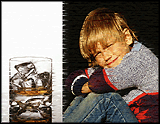Growing Up Sober: A Challenging Journey for Adult Children of Alcoholics
Suzanne grew up in a house where yelling and criticizing were as much a part of daily routines as her father’s two glasses of gin after work. “No emotion was acceptable to show except anger,” says the 37-year-old mother of three.
Living with her father’s alcoholism—a family disease that she understood at some level but that was not acknowledged publicly—left her angry, depressed, and insecure. When she was in high school, Suzanne threatened suicide because she wanted to see a counselor. Today, with three young children and a marriage of her own, she attends a support group regularly. She works every day to keep her compulsive tendencies in check as she continues to deal with the lingering aftershocks of growing up in the shadows of alcohol abuse.
Suzanne’s experiences are far from unique. Whether homes included emotional, psychological, or physical abuse, the scars left by an alcoholic parent often last long into adulthood.
Common Complaints
 “Growing up in an alcoholic family has long-term consequences on the development of the person,” says Michael Nuccitelli, PhD, executive director of SLS Wellness inBrewster,NY. “It literally impacts all fronts of life.”
“Growing up in an alcoholic family has long-term consequences on the development of the person,” says Michael Nuccitelli, PhD, executive director of SLS Wellness inBrewster,NY. “It literally impacts all fronts of life.”
Adult children of alcoholics (ACOAs) may suffer a wide range of negative effects because of their family backgrounds, including:
- Increased likelihood of becoming alcoholics
- Higher rates of mental disorders, such as depression, rage, and fear of responsibility
- Higher rates of marrying into alcoholic families
- Higher rates of becoming separated or divorced from their spouses
Dr. Nuccitelli explains how typical ACOAs tendencies can affect critical elements of life:
- Romance—Trust and security, two necessities for successful long-term relationships, do not come easily for many ACOAs, who grew up in insecure homes and may choose to isolate themselves from others. In addition, because many alcoholic parents were—at least sometimes—more devoted to drinking than to affection for their children, ACOAs often have a strong need for affection, which can manifest itself as possessiveness, jealousy, and oversensitivity.
- Parenthood—Their strong desire to be loved can lead ACOAs to inspire dependency in their own children. They may also use intimidation, which is never effective in the long-run, to maintain control in the home.
- Work—Because of their powerful need for acceptance, ACOAs may not provide enough structure for employees, who can then capitalize on their employer’s weaknesses. Also, ACOAs may suffer from the “impostor syndrome”—no matter how impressive their achievements, they never feel worthy.
- Money matters—ACOAs need for approval can lead them to overspend, buy dinners they cannot afford, or otherwise pay beyond their means to please others.
Finding Help
The depth to which alcoholism affects ACOAs’ daily lives depends on a wide range of variables—from their own personalities to the extent to which the disease dominated their developmental years. All ACOAs can benefit from learning strategies that will help them overcome negative behaviors and chart courses for their own healthy futures, says Dr. Nuccitelli. However, no single method works best for everyone. Options include:
- Reading—Find the latest books and research, both in print and online, about alcohol abuse and the way it can affect family life.
- Talking—Confide in a close friend or family member who can understand your feelings and respect your privacy without judging you.
- Counseling—Meet with a psychologist or certified social worker who can help you focus on your future, not the pains of the past. Sometimes talking with a stranger can be more therapeutic than talking with a friend.
- Joining—Become part of a free support group that meets in person or in a private online chat forum to find out how other ACOAs have overcome barriers to happiness. Twelve-step programs, such as Al-Anon and Adult Children of Alcoholics (ACA), can be particularly empowering. Suzanne credits her 12-step support group, which she calls a “clearinghouse for coping skills,” with much of her recent progress.
No matter what method or combination of methods an ACOA chooses, the focus should remain positive. “It is important to know why we do what we do, but it is most important to change what we do for the future,” says Dr. Nuccitelli.
Accentuate the Positive
Dr. Nuccitelli, himself an ACOA, points out that the adversity ACOAs face also creates desirable character traits that should not be overlooked. “We learn from hardship,” he explains. “We develop resilience and strengths.”
ACOAs tend to be highly motivated, ambitious, attentive, and affectionate. They also show plenty of empathy because they understand other people’s pain.
For Suzanne, recognizing those positives and keeping the negatives under control takes an effort—one that she deals with as best she can, one day at a time. She sees each new day filled with choices, only some of which she can control. “We can only change our own attitudes,” she concludes. “That is where health resides.”
REFERENCES:
Adult children of alcoholics. Florida Alcohol and Drug Abuse Association website.
Al-Anon is for adult children of alcoholics. AL-ANON Family Groups website.





